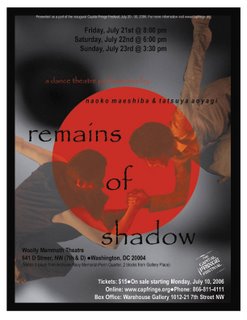A thin glimpse of Capital Fringe [theatre-scene report]
So: Washington, DC has just seen its own first annual fringe festival. In gone years, I would have been all over the thing -- or at least more attentive to its contents, then I happened to be in the instance. I've enjoyed (bits of) similar summer festivals in Los Angeles (briefly, in the mid-'80s) and the superb New Performance Festival in the Bay Area circa 1986(?) (which I covered for the Daily Californian, the UC Berkeley newspaper; perhaps I wrote something in The Express about it too) (not really a fringe festival: it was curated and featured maybe 10 shows rather than maybe 200; but it held the marathon feel (and fine glimpse of the New) a fringe festival can offer); and I've attended a few stray events at a couple of Fringes in NYC over the years. One being a Tom Waites / Robert Wilson work (rather surprising combo); Janet Fine (whose hat hangs mainly in Mumbai these days) enjoyed that with me.
 I don't know if this DC event was poorly publicized, or if I've just been remiss anent local newspapers (surely it was featured in the Post and presumably touted in the City Paper; alas, I've become locally inattentive -- NYTimes online being my more habitual paper lately). Anyway, I woudn't have known of its existence, except that I was called in to serve as videographer (as I've done frequently over the past half-dozen years) for my friend, the Baltimore-based theatre/dance innovator Naoko Maeshiba's fringe offering, a 2-person multimedia performance work (somewhat Butoh-based), "remains of shadow." I'd seen an earlier incarnation of (some bits of) the duet work a couple years ago; but Naoko and Tatsuya Aoyagi have really expanded and developed this to a high level. (I was happy to learn it will travel to San Francisco's NOHspace later in the year.)
I don't know if this DC event was poorly publicized, or if I've just been remiss anent local newspapers (surely it was featured in the Post and presumably touted in the City Paper; alas, I've become locally inattentive -- NYTimes online being my more habitual paper lately). Anyway, I woudn't have known of its existence, except that I was called in to serve as videographer (as I've done frequently over the past half-dozen years) for my friend, the Baltimore-based theatre/dance innovator Naoko Maeshiba's fringe offering, a 2-person multimedia performance work (somewhat Butoh-based), "remains of shadow." I'd seen an earlier incarnation of (some bits of) the duet work a couple years ago; but Naoko and Tatsuya Aoyagi have really expanded and developed this to a high level. (I was happy to learn it will travel to San Francisco's NOHspace later in the year.) This was held in a (thankfully) well appointed space [in contrast to Andy's Des Moines experience] -- the new schnazzy venue that the (surreal disfunctional family drama comedy, if this is a fair thumbnail characterization) Wooly Mammouth Theatre Company now calls home. Contemporary theatre in DC is one of the strongest art forms here, by and large; by contrast, new music is rather straggling and struggling in the background, with only a handful of proponents. (My scale for comparison is cities like NYC and SF.) Anyway, notwithstanding the good theatre space, it seems the performers were jammed a bit tight in terms of tech rehearsal time, but pulled off a credible, indeed fine show. (I videotaped the 1st and 3rd of their three performances.) But I failed to catch anything else in the fest. It seems I'm preoccupied with other obligations & aims this season. Anyway, a more official writeup (preview article -- a tad too terse, but giving some overview) can be seen here.
This was held in a (thankfully) well appointed space [in contrast to Andy's Des Moines experience] -- the new schnazzy venue that the (surreal disfunctional family drama comedy, if this is a fair thumbnail characterization) Wooly Mammouth Theatre Company now calls home. Contemporary theatre in DC is one of the strongest art forms here, by and large; by contrast, new music is rather straggling and struggling in the background, with only a handful of proponents. (My scale for comparison is cities like NYC and SF.) Anyway, notwithstanding the good theatre space, it seems the performers were jammed a bit tight in terms of tech rehearsal time, but pulled off a credible, indeed fine show. (I videotaped the 1st and 3rd of their three performances.) But I failed to catch anything else in the fest. It seems I'm preoccupied with other obligations & aims this season. Anyway, a more official writeup (preview article -- a tad too terse, but giving some overview) can be seen here.Exiting the theatre, I noted (next door) a particularly fancy Indian restaurant called Rasika -- a name ringing rueful bells for me, recalling my long-ago venture in arts management (Rasika Productions) and (more pointedly), considering the currently woefully in-limbo status of my would-be / future publishing imprint (Rasika Editions). Although, inshallah, that looks potentially poised to change next year. ("Rasika" is Sanskrit argot for connoisseur.)
Must give Rasika Restaurant (or their webbuilder) credit for an unusual Flash site. But on Sunday late afternoon, they were closed; I enjoyed a bowl of soup, instead, at the cafe at Olsson's Books on 7th Street -- where I also purchasd Jose Saramago's superb novel All the Names. I'm in a phase of reading (perhaps) all his books -- started with The Double (2004), then the little fable Tale of the Unknown Island (1999); All The Names (1999); and I'm currently getting into The Cave (2002). Will write about Saramago's work in future. Morning is already here, with its fish to fry.
=================
After blogging the above, I exchanged shoptalk chitchat (by email) with Maida Withers -- our local dance/performance mater familias. She remarked,
Naoko did this performance at the Ko Festival (same as Wendy [Woodson]'s location this year) in Amherst, MA last year . . . I like Naoko so much. Sticking to this duet is such a good plan for her. The Woolly Mammoth is a small space (15 x 22 or something). It is a little tight for dance and technology unless you strip the space, perhaps.I replied,
It's true the stage is small -- but it proved suitable for a "contained" (compact in space) work such as Naoko and Tatsuya did.=================
So that is a good point about the space limitation. It could work quite wonderfully for ( e.g.) Indian classical dance, which is typically performed very compact in space. It's funny I hadn't thought about how small the stage is. Moreover, its odd angle (a jutting-out corner of a rectangle slightly off-center toward middle of downstage) could call for special blocking. But I suppose some sorts of work could be tailor-made for such a stage. Naoko used projected DV in parts of the piece. It was a bit dim (the projector maybe not so powerful), but seemed to work very well with the piece.
A bit later in morning, I began to read Charles Simic's take on the Dada exhibit, and felt a little frisson or trace of century-spanning echoes --
On February 5, 1916, Hugo Ball, a German avant-garde theater director, and Emmy Hennings, his mistress and a nightclub singer, opened for the first time the Cabaret Voltaire in Zurich where they presented exhibitions of contemporary art and performances of experimental music, poetry, and dance. The cabaret had a small stage, room for forty to fifty people in the audience, and was located in a seedy neighborhood of bars, variety shows, and cheap hotels in an otherwise respectable city in which many expatriate artists, writers, journalists, actors, intellectuals, and professional revolutionaries were then living, as well as international war profiteers and spies. Lenin rented rooms on the same narrow alley. Joyce worked on Ulysses in a neighborhood not very far away.And the story goes on . . .
Dada did not yet exist as a movement, nor did it have a name. What started as a series of evenings where poems of modern German and French poets were recited, art songs performed, and compositions by Franz Liszt, Alexander Scriabin, and Claude Debussy played on the café's piano changed over the next few weeks into something quite different under the influence of new arrivals on the scene.They were the poet Richard Huelsenbeck, whom Ball had known in Berlin, the Alsatian-born artist Hans Arp, and the twenty-year-old Romanian poet Tristan Tzara and his not-much-older compatriot, the painter Marcel Janco. What brought them together was their hatred of the war and their belief that both art and politics needed a revolutionary change. . . .
[blogo-link: the festival "thin glimpse" here perhaps follows from (or vaguely relates -- as items of a kind -- to) the tangential Bread & Puppet Circus recollection-wisp jotted in wake of posting my old poem "Escalator" (Dec.22 2005).]





